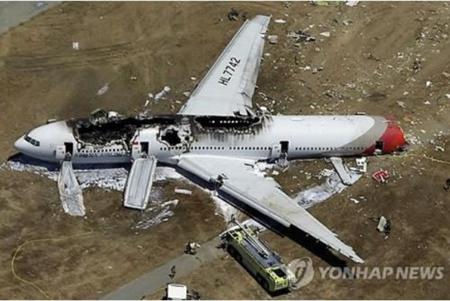SEJONG, Nov 15 – Asiana Airlines Inc., South Korea’s No. 2 flag carrier, was ordered Friday to suspend its services to San Francisco for 45 days as punishment for a passenger jet crash in the U.S. city last year that left three people dead.
Under Friday’s decision by a seven-member review committee, Asiana will be barred from operating its Incheon-San Francisco route for the penalty period from a date of its own choosing, the Ministry of Land, Infrastructure and Transport said.
Asiana Airlines will have 15 days to appeal the decision, the ministry said.
The U.S. National Transportation Safety Board (NTSB) in June had concluded after a joint investigation with South Korean experts that pilot error was the main cause of the Asiana flight’s crash landing at the San Francisco airport in July 2013.
 The wreck of Asiana Flight 214 at San Francisco International Airport (Yonhap file photo)
The wreck of Asiana Flight 214 at San Francisco International Airport (Yonhap file photo)
The crash of Flight 214, a B777-200ER wide-body jet carrying 307 people, not only caused deaths but injured some 180 people.
“All committee members agreed a suspension of operation was inevitable,” Kwon Yong-bok, head of the ministry’s aviation security division, told reporters.
According to aviation safety law, an accident involving casualties is punished with a minimum 90-day suspension, according to the official.
“The committee decided to reduce the duration by 50 percent, which is the maximum reduction allowed under the law, considering the sincere and dedicated evacuation efforts by the flight’s crew that helped minimize casualties,” Kwon said.
Asiana previously said a 90-day suspension would cause a loss of some 20.8 billion won (US$18.9 million) in sales.
The government was initially said to have considered only imposing fines without an operational suspension.
Kwon, however, said the government decided to send a clear warning to all airlines to prevent future accidents. The maximum fine for a fatal accident is only 2.2 billion won.
“What we sought to do before anything else was to improve airline safety. Ensuring airline safety came before punishing the involved airline,” he added.
Related to the decision made by the ministry, Asiana issued a statement saying it will appeal the suspension and stressed it intends to actively show why the measures are too harsh. It even said separate legal actions are being considered at present.
The airline argued that the government did not take into account the findings released by the NTSB that clearly stated the crash was not caused by any intentional dereliction of duty or violation of safety-related rules on the part of Asiana.
“Authorities, moreover, effectively did not consider the national interest and the appeals made by the CEO of International Air Transport Association and other airlines that fly into Incheon International Airport,” the company said. These airlines all argued that flight suspensions did not in any way improve safety.
Only Korean Air Lines Co., Asiana’s main rival, and its budget division, Jin Air, did not take part in the petition calling for leniency.
Asiana then argued that the government could have opted to just slap fines on it, instead of calling for a flight suspension because taking the latter step will cause a considerable inconvenience to passengers.
The company pointed out that it ferries some 170,000 passengers on its San Francisco route annually, with 70 percent of the passengers being foreigners. It said the passenger occupancy rate on the route stands at 85 percent, so any suspensions will pose serious problems for travelers.
Asiana stock prices rose 4.58 percent on the Seoul bourse to close at 4,685 won Friday. The benchmark KOSPI fell 0.78 percent. The ministry announced the suspension during the trading session.




